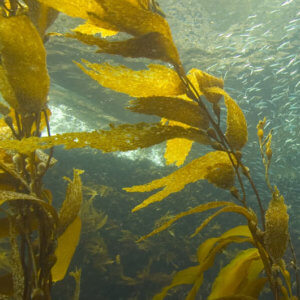 The Urban Coast Institute’s Marine & Environmental Speaker Series returns Nov. 10 from noon to 1 p.m. with “Is Seaweed a Fish?” by Ethan Prall, Esq. The talk is free and open to the public. Upon registration, attendees will receive an email with the Zoom link for the event.
The Urban Coast Institute’s Marine & Environmental Speaker Series returns Nov. 10 from noon to 1 p.m. with “Is Seaweed a Fish?” by Ethan Prall, Esq. The talk is free and open to the public. Upon registration, attendees will receive an email with the Zoom link for the event.
Abstract
This presentation argues that fisheries regulation under the Magnuson-Stevens Act should be modified to help facilitate the growth of the seaweed industry, which scientists have claimed can provide a key climate mitigation tool. In my work at Latham & Watkins, I have represented a pro bono client involved in innovative seaweed harvest technology. As I argue, seaweed harvest—primarily wild harvest rather than aquaculture—promises both benefits and costs, and legally, it thus should be neither completely prohibited nor allowed without restriction. Instead, federal seaweed regulation in the U.S. can provide a striking example of regulatory “compromise.” Although seaweed harvest is not a traditional kind of “fishery,” I argue that, in the absence of federal legislation directly governing seaweed, the Act’s regulatory regime can be applied to seaweed harvest with certain modifications that facilitate experimentation by the industry, absent serious environmental harms. Navigating this middle ground requires careful attention to the structure of the Act, to the science and policy of seaweed harvest, and to mechanisms for achieving regulatory equilibrium.
Bio
 Ethan Prall, Esq. is an environmental lawyer and policy advocate at the law firm Latham & Watkins LLP, in Washington, DC. He represents clients on a variety of domestic and international environmental and clean energy law and policy, including: creating the government for a new clean energy zone overseas, offshore wind energy permitting, Endangered Species Act consultations, and litigating against the Trump Administration’s rollback of California’s vehicle emissions standards. His scholarly work focuses on addressing the global challenges posed by anthropogenic change on natural systems, such as climate change and biodiversity loss. His latest publication, forthcoming Spring 2021, focuses on U.S. federal regulation of seaweed farming as a potential climate change mitigation tool. He holds a B.A. from Texas A&M University, an M.T.S. from Duke University, and a J.D. from Harvard Law School.
Ethan Prall, Esq. is an environmental lawyer and policy advocate at the law firm Latham & Watkins LLP, in Washington, DC. He represents clients on a variety of domestic and international environmental and clean energy law and policy, including: creating the government for a new clean energy zone overseas, offshore wind energy permitting, Endangered Species Act consultations, and litigating against the Trump Administration’s rollback of California’s vehicle emissions standards. His scholarly work focuses on addressing the global challenges posed by anthropogenic change on natural systems, such as climate change and biodiversity loss. His latest publication, forthcoming Spring 2021, focuses on U.S. federal regulation of seaweed farming as a potential climate change mitigation tool. He holds a B.A. from Texas A&M University, an M.T.S. from Duke University, and a J.D. from Harvard Law School.
